Related Content
Content
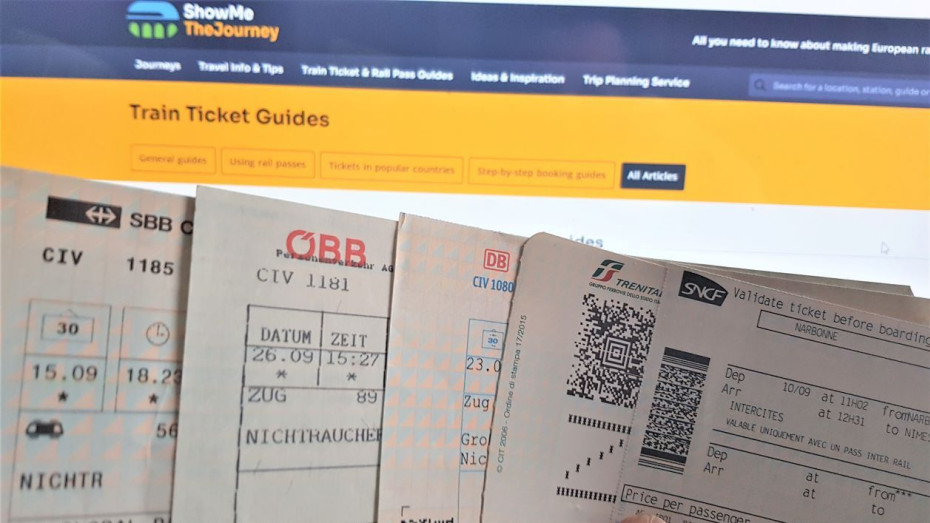
11 Things to look out for when booking European rail tickets
If you're asking why can't I find the journey, the ticket or the price I'm looking for when using a European rail booking service online, you'll likely find an explanation here.
Share
Booking tickets for the overwhelming majority of European journeys by train is straightforward, you can look up the journey online, see a range of tickets and prices for each departure, choose which suits you and make the booking.
Though there are also undeniably many instances in which this anticipated simplicity can in reality have complications.
And it’s also possible to make a booking without being made aware of alternatives, which may otherwise have been a preference.
This situation, particularly when booking longer and more complicated international journeys on mainland Europe, will be changing for the better in coming years, but until then, here are 11 things that are worth looking out for when booking European rail tickets online.
1: The variations in how far ahead tickets can be booked
Discounted types of ticket are made available for the overwhelming majority of European express trains, the main exceptions being journeys within Belgium and The Netherlands; and these type of tickets are nearly always cheaper when they are first placed on sale.
So booking as soon as possible can be a money saver, but what isn’t consistent is how far ahead of the travel date tickets are made available.
The usual ticket booking windows are:
- 1 month ahead = Poland
- Up to 2 months ahead = Denmark
- Up to 2 months ahead = Czechia/The Czech Republic
- Up to 2 months ahead = Hungary
- 12 - 13 weeks ahead = Norway
- Up to 3 months ahead = Great Britain
- 2 - 6 months ahead = Spain the AVE trains to/from Madrid and the TGV trains between France and Spain are now available up to 6 months ahead.
- Up to 4 months ahead = the IC day and night trains in Italy
- Up to 4 months ahead = France
- Up to 6 months ahead = Austria
- Up to 6 months ahead = Germany
- Up to 6 months ahead = the Frecce trains in Italy
- Up to 6 months ahead = Sweden
- Up to 6 months ahead = Switzerland - this is a recent change
- Up to 6 months ahead = Eurostar on all routes including to and from the UK
But notice the use of the word ‘usual’ because what causes variations in these periods of time, is that tickets cannot be released for sale until the departure info of the train has been confirmed.
European rail timetables are typically amended twice per year, with a minor change on the second Sunday in June; and a major change, which impacts on virtually all major routes, occurring on the second Sunday in December.
The work to set these timetables isn’t usually completed until around two months before the new timetables take effect; so when looking up journeys for travel after the second Sundays in December and June, the usual booking periods will often have been reduced to 2 - 3 months ahead.
So in countries with booking periods which are typically longer than 2 months ahead, such as Austria, France, Germany, Great Britain, Italy, Spain and Sweden; if you then look up a journey more than 2 months ahead for a travel date after the second Sunday in December, there’s a good chance that you won’t find the anticipated tickets available.
Inconsistency across the agents
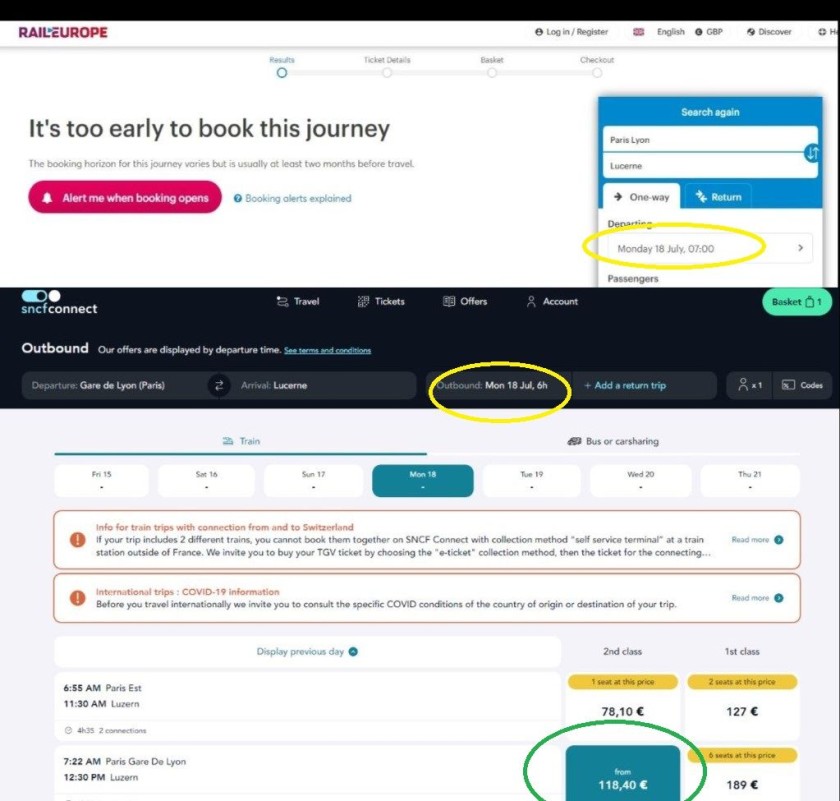
Those ticket availability periods can also impact on differences between online availability on agents which sell the same route.
For example, when looking up journey from France to Switzerland which requires a connection on the French national rail ticket service, SNCF Connect, typically all of these journeys will be available from 4 months ahead, as that is in line with the French ticket release policy.
However, other agents which also sell the same journeys, including Trainline and RailEurope, typically only release tickets for these same routes two months ahead, because what they are evidently being led by, is when the tickets are released for sale for the Swiss section of the journey.
...and in Great Britain
For journeys in Great Britain another scenario to keep in mind is that the discounted Advance tickets can be released for sale a couple of weeks after other, more expensive types of ticket, have been made available.
2: Journeys which are possible, but aren't sold online
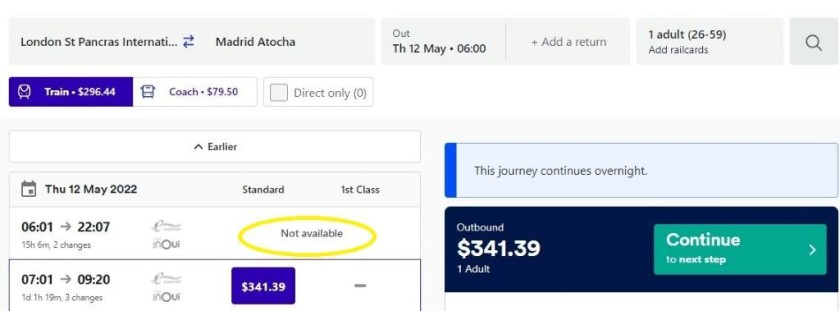
Journeys which require connections can create situations which online ticket agents cannot manage; so when a lengthy journey requiring multiple connections is possible because it can be completed by the end of the day, it doesn’t always follow that you’ll be able to find your journey online when attempting to make a booking.
The variables in this scenario are many; but they typically include:
- Journeys which involve making more than two connections; particularly when making an international trip,
- Most national rail ticket agents can’t sell international end-to-end journeys which require connections between trains in other countries; though DB (Germany) is an exception.
- Journeys which involve making connections in and out of night trains.
If you will be taking an indirect international journey, the better option can be to look it up on an independent booking service; as one of their specialties is bundling together the multiple tickets required to complete an end-to-end-journey into a single booking; though you will then often have to pay the booking fee that will be added to the total charge.
Though on occasion the only option can be to make entirely separate bookings with different agents.
Though be wary of the pitfall that for the time being, if you do opt for this and delayed train causes a missed connection(s), you may have to have then re-book your subsequent journeys in a chain.
So a tip is to avoid booking the first available onward train on your route and instead extend the time you’ll have between connections.
3: The length of the transfer time between trains
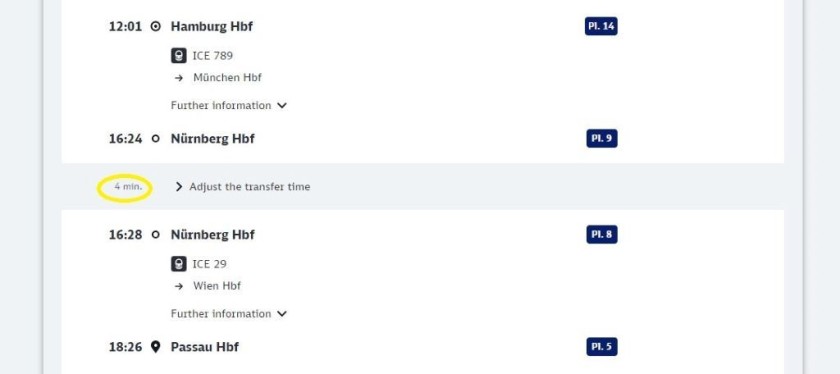
When a journey involves taking more than one train, the usual default of the ticket agents is to assume that travelers will want to reach their end-to-end destination as quickly as possible.
It typically takes no more than 5 minutes for travellers to make their way from one train to another at a major station, so the ticket agents often allow another 5 mins in case of confusion; and because not everyone has the fitness levels of an Olympian.
Therefore when end-to-end journeys are offered for sale, the connecting time between trains can be as little as 10 mins, or even less.
Some agents including DB (Germany), CD (Czechia), OBB (Austria) and SBB (Switzerland), will sensibly allow ticket bookers to proactively extend this period of time, but others (including SNCF Connect and Trainline) won’t.
Due to the focus on the fastest end-to-end time, the agents can also not show eminently feasible journeys when alternative connections will allow more than an hour to make a transfer.
However, this can be frustratingly inconsistent; when connecting times between trains of 90-120 mins are the only option, it can be possible to look up the journeys for one travel date and see the tickets for such an end-to-end journeys, but on other dates they can’t be found online; even when the trains are operating to a usual schedule.
So if you want to allow more than an hour between trains, or can’t find the journey on your travel dates, booking separate tickets can be the only option; but whether you will or won’t have to do this, can vary.
4: The impact of the works on the line
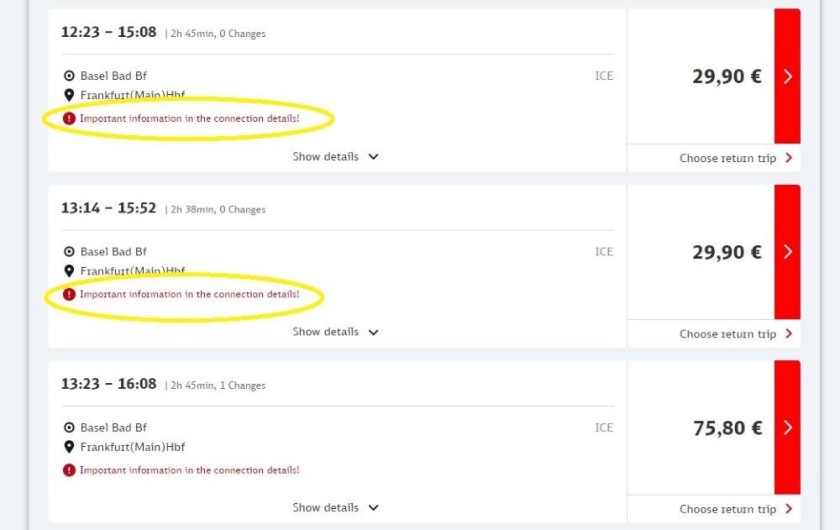
Works on the railway lines inevitably disrupt the usual train schedules and that often then impacts on how tickets can and can’t be sold on the dates when the works are occurring.
The train ticket providers tend to refrain from making it blatantly obvious that the service is being disrupted, which can mean that anticipated tickets just won’t be visible, with no explanation offered.
They can then be added to the ticket booking service at a later date, once the revised schedules have been confirmed, but this can be frustratingly random.
In Great Britain, if diversions or substitute bus services are being required, only the more expensive types of ticket will be placed on sale, with the only clue to the disruption to the service being a longer than usual journey time.
In Germany DB can offer tickets for sale, even when it is warning the users of the online service, that the end-to-end journey by train won’t actually be possible.
Though its use of an exclamation mark and prominent text on its booking service warning users of disruption, is a welcome, but unusual example, of a ticketing website being upfront about changes to the usual schedule.
Tickets for night trains
European night train routes are more likely to have their usual schedules altered than day trains, because the majority of night train routes exceed 800 km / 500 miles.
As they also spend long periods of time travelling overnight between distant station calls, the night trains can de diverted on to longer routes, without any other impact than longer end-to-end journey times.
However, these altered timings, routes, scheduled etc are often not confirmed until 6 - 8 weeks ahead of a travel date.
So it's not unusual for tickets to travel by specific night train departures to be placed on sale until around 2 months ahead - even though the tickets to travel by daytime trains are already available.
Click the country names below to check works on the line:
5: Replica departures:
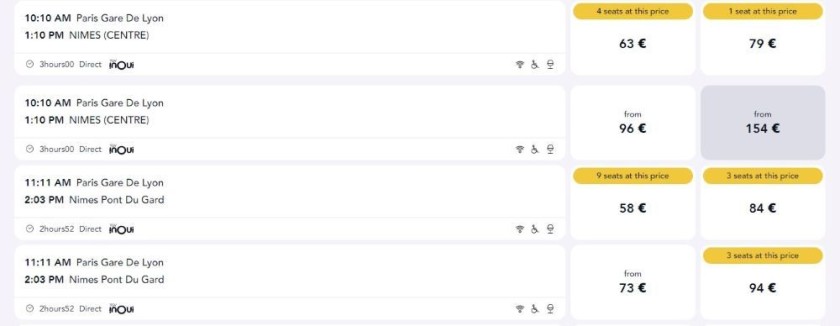
Many European countries including France, Germany, Italy and Spain use a train numbering system; a train will be assigned a number which is used throughout its journey.
Some train booking services, including SNCF Connect, evidently use these train numbers as a factor in determining which departures will be offered for sale.
But two trains, each with different numbers, can be joined together for the majority of a journey; they have different numbers because they will ultimately separated in order to serve different destinations.
But for the parts of the journey when they will be joined together, they can be listed separately by the agent, so it looks as though the same departure is being repeated.
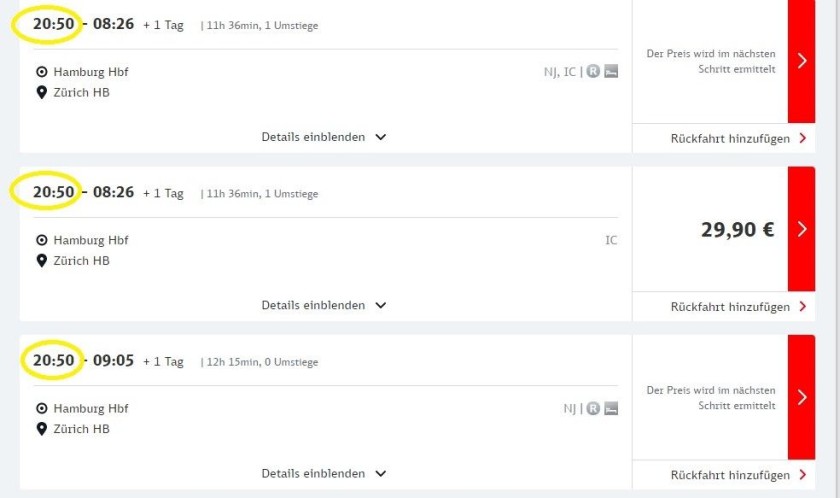
Night trains
For daytime journeys it doesn’t matter which of the replicated departures you select, but it can matter for night trains.
Night trains typically have multiple sections; one part of the train will comprise the coaches with seats, while the other part of the train will convey the sleeping accommodation and these parts of the train can have separate numbers
Therefore the booking agents can list each of these parts of the train separately so one booking link will take you to the seats; and the other, for the same train, will lead to the booking path for the couchettes and sleeping cabins.
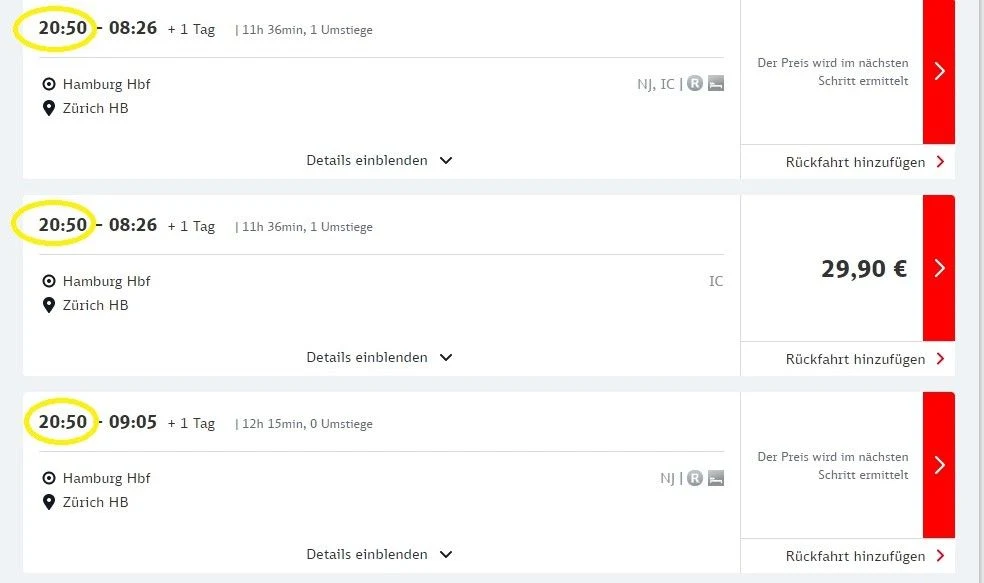
On the German national rail booking service, DB, it splits the overnight journey into multiple options, in this example it has listed:
- Travel in the sleeping cabins, the NJ (Nightjet) part of the train and make a connection in order to arrive at the final destination, Zurich, sooner
- Travel in the seats (IC) and make the same connection
- Travel in the sleeping cabins direct to Zurich; though what's missing is the option of booking the seats in the IC part of the train for a direct journey to Zurich
6: Booking sleeping accommodation on night trains:
The booking agents can take different approaches to how bunks in couchettes and beds in sleeping cabins can be purchased for journeys by night trains.
The two key things to watch out for are:
- How the prices are indicated.
- How tickets are sold when you don’t want to book every available place in a sleeping cabin.
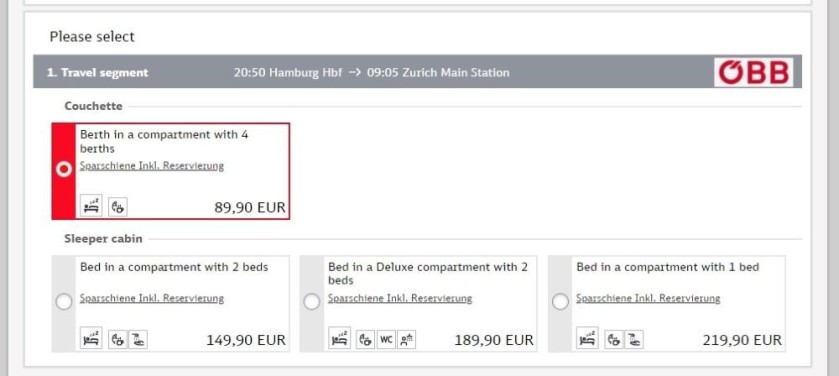
For the prices, some agents, including DB as shown above, will show the full cost up-front, but on other agents, including CD (Czechia), OBB (Austria) and Trenitalia (Italy) the price of travelling in a seat is in effect the ‘base’ price.
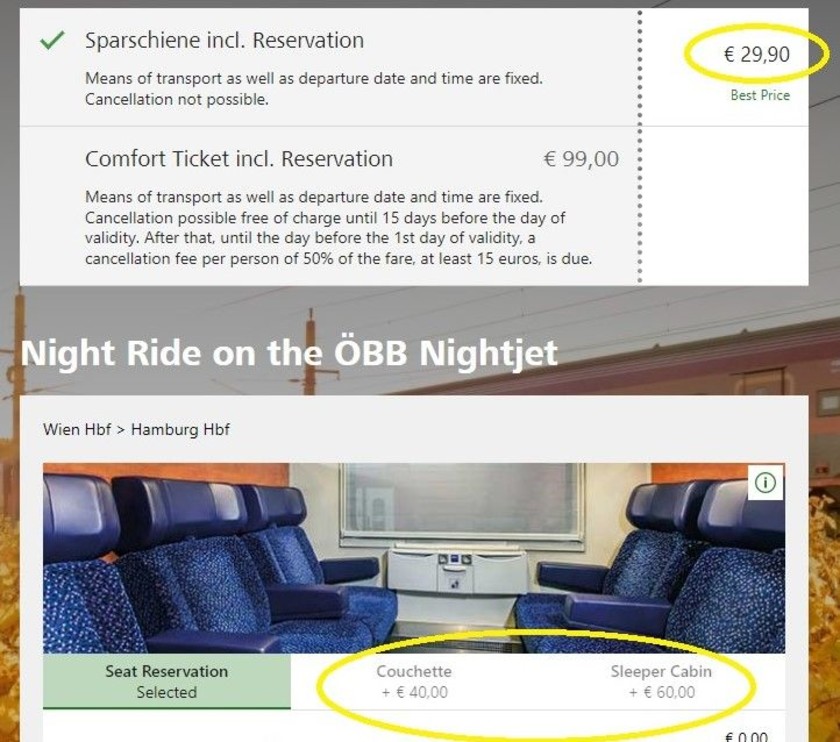
This is the price which will be shown when you look up a journey, but the couchette and sleeping cabin options are sold as additions to this base price - as above this is the methodology used by the Austrian national rail operator, OBB.
If you want to travel in a sleeping cabin (or more occasionally couchettes), some agents will sell places per passenger in a cabin based on how many people the cabin can accommodate.
When booking you choose a place in a one bed, two bed or three bed cabin; or in a 4 berth or 6 berth couchette compartment; this is how places are allocated when booking journeys on Nightjet trains.
But other operators/ticket agents including Caledonian Sleeper will only sell an entire sleeping cabin or a couchette cabin at a flat rate.
So if you want sole use you in effect pay the full flat-rate price, but if you will be travelling in a group you can in effect split the cost, or if you will be travelling as family, you only pay the flat-rate price
Other operators such as Snalltaget split the booking options into price per person AND price per cabin.
7: Paying the optimum price
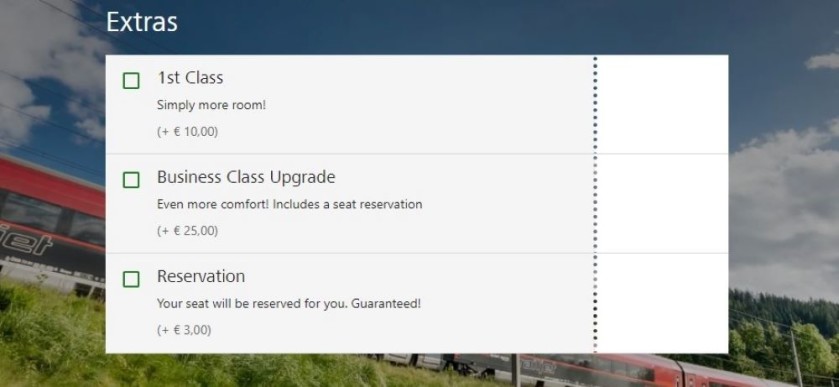
Every service which sells European train tickets online takes its own unique approach to how ticket prices are displayed.
So having become familiar with how the service you most regularly use displays its prices, it’s easy to become at best confused when having to make a booking on an alternative website.
Some agents including SNCF Connect and most rail operators in Britain will initially show prices of 2nd and 1st class tickets adjacent to each other.
Users can then compare the price difference between the classes of travel at a glance.
However, on other agents, including OBB (Austria), NS International (Netherlands) and now DB (Germany), only the cheapest 2nd class price will be visible when initially looking up a journey.
Booking a 1st class ticket is offered as an upgrade to a 2nd class ticket; RENFE in Spain now also uses this upgrade a booking approach for its most common type of 1st class ticket.
When reservations are optional, but incur a cost, they are also usually available by proactively upgrading the booking in order to include them.
How prices are shown for different types of ticket
Different types of ticket will also typically be available; the more terms and conditions a type of ticket has, the cheaper it will be, but how the prices of each type of ticket are shown can vary across the agents.
Some, such as DB and most British booking services .will show the full price upfront of these additional tickets.
So look out for the fact that despite some of the more visible prices being more expensive than others, it doesn’t automatically mean that the higher price you’re seeing will give you a more comfortable seat or access to more on-board services.
Because instead of being the prices of travelling in each class on the train being shown, what you can be seeing is the prices of the different types of 2nd class tickets.
Some of the prices will be more expensive because of enhanced terms, such as being able to claim a refund if you subsequently cancel your trip.
However, other booking services including OBB, will offer the more expensive type of ticket as upgrades to the most basic type of ticket; and the most prominent price therefore initially displayed, will be the price of the upgrade.
8: Missing cheaper alternative trains
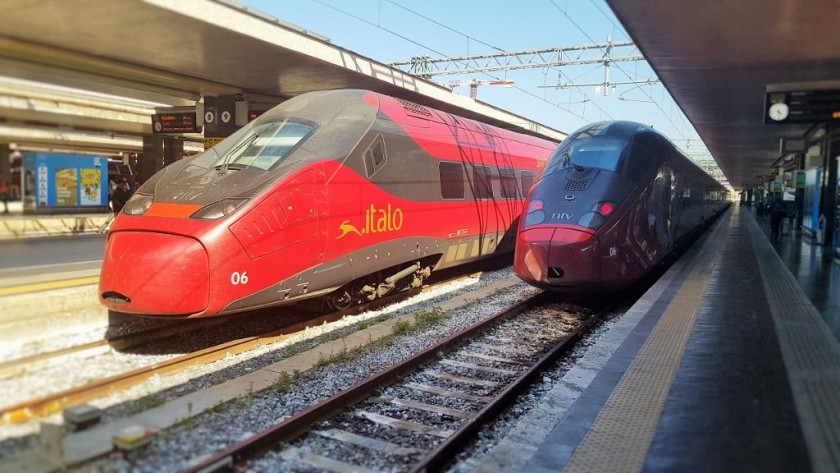
Multiple different train services are now available when travelling on many routes, including:
- on the high speed lines in France and Italy
- on some popular routes in Czechia, Germany and Great Britain
- and between these cities;
Barcelona ↔ Madrid
Praha ↔ Wien
Stockholm ↔ Goteborg
Wien ↔ Salzburg
Paris ↔ Milan
But when multiple services are available, they’re often not listed together on the booking services, because when other companies set up services to compete with the national operators, the booking services of the national rail operator inevitably won’t offer those other services for sale.
In some of these circumstances, including the Italian high speed journeys, the independent booking services such as Omio and Trainline can be a good option as they will offer trains from multiple companies; though that isn’t the case on the routes in Czechia and Sweden.
For the French high speed journeys, SNCF Connect will sell both the standard InOui trains and the cheaper Ouigo services, but Trainline is the only independent booking service that SNCF partners with, which lists Ouigo services.
The Ouigo services also aren't available on RailEurope.
So using the journey guides and comparing prices across the booking agents for each of the journey options, can be the only method of seeing the full picture of ticket availability.
9: Booking child tickets
Each country sets its own policies for the ages at which adult prices are charged for train journeys; so depending on how old the children will be on the travel dates, travelling with kids can be comparatively expensive, or fantastic value for money.
In particular just because you’ve been dismayed to discover that the teenagers in your travel party have had to travel at the adult rate on a journey you’ve taken, don’t assume that will always be the case.
Children are aged:
- under 17/aged 16 and under in Finland
- under 16/aged 15 and under in Great Britain, Norway, Sweden and Switzerland
- under 15/aged 14 and under in Austria, Czechia, Germany, (Italy - express trains) - and Slovakia
- under 14/aged 13 and under in Hungary and Spain
- under 12/aged 11 and under in Belgium, Croatia, Denmark, France, Greece, Hungary, (Italy - regular trains), Portugal and The Netherlands.
So if you will be travelling with a 13 and 14 yr old by a TGV train from Paris to Nice you will be purchasing 3 x Adult tickets, but if you were to book a discounted ‘Sparscheine’ ticket on a journey from by ICE train from Hamburg to Wien/Vienna you’ll only need 1 x Adult ticket, because there will be no charge for the 13 and 14 yr old.
How many children can travel with each adult at no charge or discounted rates can also vary widely.
10: InterRail or Eurail passes can be cheaper than booking tickets
An adult InterRail or Eurail pass valid for 4 days of travel typically costs €246; prices can be discounted during promotions and passes are also available for 5, 7 and 10 days of travel; and longer periods.
Therefore if the total price you're seeing for a return trip; or a one way trip involving multiple days of travel is more than €246; it can be worth checking to see if an InterRail or Eurail pass will be a money saver.
You'll probably need to also add the costs of mandatory reservations for rail pass users to the total price, so some basic maths will be required; or you could make use of the trip planning service; but even so a rail pass could still be cheaper.
What can tip the balance towards the rail pass being a good option is that the annual prices of using Eurail and InterRail passes are fixed, but the prices of discounted tickets which can be booked in advance, rise according to demand.
So tickets tend to be more expensive in summer and around and during national and school holidays.
Though on some routes including Eurostar and on high speed trains in France, the number of reservations / places available for rail pass users is limited, so before committing to booking a pass instead of tickets, you'll need to confirm that you can book seats on your travel dates.
You'll be more likely to save with Eurail and Interrail if you are aged 16-26, as passes are available at Youth Rates, but in virtually all European countries those aged 16 and over pay the adult prices for rail tickets; it is common for Adult rates to apply for those aged 12 and over (see above), but the Youth rate for Eurail / InterRail applies to anyone aged 12-26.
You'll be less likely to save against the ticket costs if you will be mainly travelling in the couchette berths or the sleeping cabins on night trains; an InterRail or Eurail pass won't include the reservation costs of a bed in sleeping cabin or a couchette and these reservation fees can be typically more than 60% of the total night train ticket cost.
11: Where you live and/or have your bank account
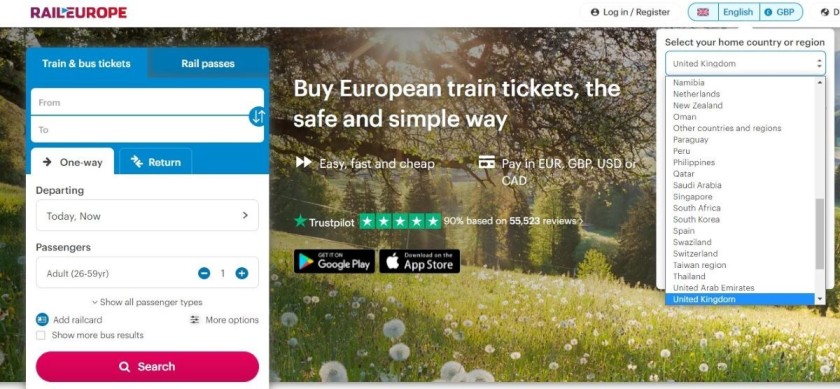
The location of your bank account can matter when booking tickets.
The most glaring example of this is that the French national rail ticket booking service, SNCF Connect, won’t process bookings from accounts in the overwhelming number of countries with no direct train connections with France.
So if you will be booking a French rail journey from the likes of Australia, Canada, India, New Zealand or the USA, you will have to use the international booking service owned by SNCF, RailEurope; and won't be able to avoid any booking fees which RailEurope will also charge.
Look for a journey guide
Please support ShowMeTheJourney
This second version of ShowMeTheJourney is exciting and new, so we are genuinely thrilled that you are here and reading this, but we also need your help.
We’re striving not to let anything get in the way of providing the most useful service possible, hence a facility has been set up with DonorBox which can be used to support the running costs and make improvements.
Instead of advertising or paywalls, your financial support will make a positive difference to delivering an enhanced service, as there’s a lot of ideas which we want to make happen.
So if you have found the info provided here to be useful, please go here to say thank you.

Simon Harper
I wanted to share my passion for train travel and explain how anyone can take the fantastic journeys I have taken.

This is one of more than 100 train travel guides available on ShowMeTheJourney, which will make it easier to take the train journeys you want or need to make. As always, all images were captured on trips taken by ShowMeTheJourney.
This second version of ShowMeTheJourney is exciting and new, so we are genuinely thrilled that you are here and reading this, but we also need your help.
We’re striving not to let anything get in the way of providing the most useful service possible, hence a facility has been set up with DonorBox which can be used to support the running costs and make improvements.
Instead of advertising or paywalls, your financial support will make a positive difference to delivering an enhanced service, as there’s a lot of ideas which we want to make happen.
So if you have found the info provided here to be useful, please consider saying thank you.










